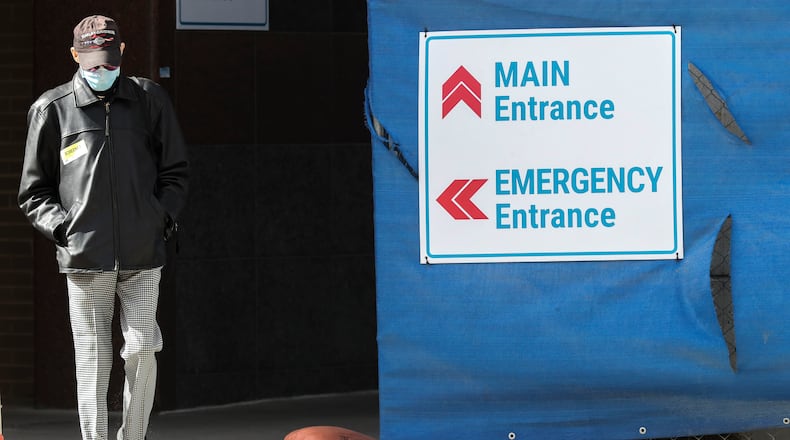State officials are quietly preparing to establish three large emergency hospitals across Georgia, including one at the Georgia World Congress Center in Atlanta, as they race to open more beds ahead of an expected surge in coronavirus cases.
Documents obtained by The Atlanta Journal-Constitution show the sprawling downtown Atlanta facility, which was to host NCAA Final Four activities this week before the pandemic upended everyday life, is being scouted as a potential site for a makeshift medical center, along with the Savannah Convention Center and an unspecified location in Macon.
It's part of what Gov. Brian Kemp described as a scramble to "ramp up for the surge that's coming" as Georgia grapples with a pandemic that has killed hundreds of the state's residents and sickened thousands more.
On Saturday the state unveiled $72 million plans to deploy four mobile medical units and expand two existing hospitals, adding nearly 300 beds as the state prepares for the pandemic's peak. That's just the start of a rapid expansion.
“We’ve turned over every rock, and we continue to do that with shuttered facilities, looking at convention center sites, mobile hospitals and other things,” Kemp said at a recent press conference.
Though details remain murky, the Georgia World Congress Center confirmed that healthcare officials have scouted the facility as a potential site.
“GWCC has been assessed as a short-term treatment facility. At this time we have not been mobilized,” said Holly Richmond, a spokeswoman for the convention center. “We are prepared and ready to assist when called upon.”
Kemp aide Candice Broce previously suggested the Atlanta convention center might not have the “ideal configuration for gas lines” to power equipment. Without commenting specifically on the GWCC, she told the AJC that state officials are reviewing multiple sites to plan for a potential influx of coronavirus patients.
An official at the Savannah Convention Center said the facility was scouted a couple of weeks ago, but she’s heard nothing since then. A spokesman for the Macon Coliseum and Macon City Auditorium said the facilities have not been scouted as possible locations, “but should we be considered, we are ready and willing to help as needed.”
The Georgia Emergency Management and Homeland Security Agency confirmed it had conducted site surveys for 200-bed facilities. But in response to questions, the agency said no construction has begun at those locations “as we are focusing our efforts on smaller facilities co-located with existing hospitals.”
Work already has begun on small facilities in Rome (20 beds) and Albany (24), while GEMA has scouted similar facilities in Atlanta (20 beds) and Macon (20).
The scramble is on
State records obtained by the AJC show GEMA and the U.S. Army Corps of Engineers have been involved in scouting locations for larger medical facilities and in screening potential private vendors to do the work. Planning for the facilities was underway by March 23.
On that date, a GEMA deputy director who helped oversee the effort notified agency officials that a task force would “determine the best method to build the capacity for 3 x 200 bed medical facilities to support Covid 19 patients in Georgia.”
“Getting the sites operational to receive patients in the most timely manner is the critical factor,” the official said in an email.
The email and other correspondence identified the GWCC and the Savannah Convention Center as two of the sites, while listing the Macon site as to be determined.
“We are still working on a recommended location in Macon, but the other 2 are definite recommendations from our team,” the GEMA official said in another March 23 email.
It’s unclear whether the agencies still plan 200 beds at each location and when they might be able to open.
And the documents leave many questions unanswered, including how the facilities would be staffed by medical professionals and where the financing would originate.
Some officials indicate the convention centers are seen as options only if less expensive alternatives, such as reopening shuttered hospitals, are exhausted.
Still, the preparations underscore the seriousness of the pandemic as Georgia races to find enough hospital beds for a growing number of patients.
Across the nation, convention centers accustomed to hosting mega-conferences and big-ticket affairs have already been transformed into emergency rooms and other medical spaces.
In New York's Javits Center, the glass-walled event hall has become a hive of activity for health care workers, and visitors at an entry desk are screened by a soldier armed with questions — and a drone with infrared sensors scanning for temperatures.
The Santa Clara Convention Center in California was remade in the past week by Air National Guard troops into a 250-bed medical facility in the heart of Silicon Valley. And construction crews in Baltimore, Boston and Los Angeles put up temporary walls and laid down lines of beds for the ill.
In New Orleans, health officials are racing to put as many as 1,100 beds in the Morial Convention Center to ease the strain on local hospitals, evoking memories of the chaotic scene from 2005 when tens of thousands were forced to use the facility as a refuge when Hurricane Katrina breached the levees.
And the McCormick Place Convention Center in downtown Chicago — the largest facility of its kind in North America — is being transformed into a 3,000-bed hospital over the next few weeks for patients with mild symptoms of the disease.
Keep Reading
The Latest
Featured






